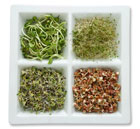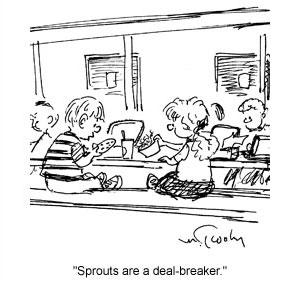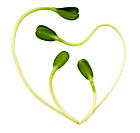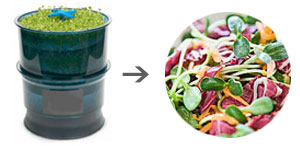Sprouts!
 Forget what you know or what you think you know about "sprouts." If you're interested in eating some of the absolute freshest and healthiest veggies (by far), then you need to clear your mind of any preconceived notions or bad past experiences with something that looks like it grew on the back of a Chia Pet. Please don't worry -- I'm not going to force you to try "hippie food" or any sort of strange green hair-like substance against your will. I know you weren't expecting to read about vegetables, sprouted or otherwise, this month. But that's why the Urbach Letter is the Forest Gump of newsletters: ya never know what ya gonna get! I promise that if you hang in here with me for a couple of minutes, you'll discover some really surprising things about an undeservedly maligned food. Forget what you know or what you think you know about "sprouts." If you're interested in eating some of the absolute freshest and healthiest veggies (by far), then you need to clear your mind of any preconceived notions or bad past experiences with something that looks like it grew on the back of a Chia Pet. Please don't worry -- I'm not going to force you to try "hippie food" or any sort of strange green hair-like substance against your will. I know you weren't expecting to read about vegetables, sprouted or otherwise, this month. But that's why the Urbach Letter is the Forest Gump of newsletters: ya never know what ya gonna get! I promise that if you hang in here with me for a couple of minutes, you'll discover some really surprising things about an undeservedly maligned food.

Not That Stuff
First things first: I'm not talking (only) about alfalfa sprouts. Like the kid depicted above, you've undoubtedly formed your (negative) attitude based upon some random encounter with alfalfa sprouts in a "too healthy" prepared sandwich -- or from that one time you suffered a lapse in judgment at a salad bar. Listen, I'm not going to defend alfalfa sprouts to you. Prepared the wrong way, from the wrong seed, they can be indeed yucky. However, what you probably don't realize is that there are many, many different kinds of sprouts, and nearly all of them are superior in taste to alfalfa. Many kinds of grain, seed, bean, and pea can be sprouted. Some of my favorites are wheat, sunflower, lentil, mung bean, adzuki bean, garbanzo, broccoli, clover, and radish. Each have a distinctive taste and texture. Radish sprouts for example are quite "spicy."
 What is a Sprout Anyway?
A sprout is very simply a vegetable seed that's been given the opportunity to germinate. Some warmth and moisture is all it takes to kick off an amazing transformation. The sunflower seed (as one tasty example) is a tiny little self-contained sunflower factory, ready to grow into a six foot tall sunflower plant. The act of sprouting this little seed unleashes a torrent of beneficial enzymes, vitamins, and phytonutrients. In just the first week of growth, this baby veggie will increase its weight by a factor of 7 to 15 times. Its nutritional value -- and health benefits to you -- will never be higher at any other point in its life cycle.
Where to Get Them
You probably won't find the more interesting, tastier types of sprouts at your regular supermarket. The best you can hope for in there are common alfalfa sprouts and maybe mung bean. A more health-oriented market like Whole Foods or Trader Joe's will usually stock a wider variety, including (in my opinion) the best commercial pre-grown sprouts available, the line from BroccoSprouts.
Is it Really Fresh?
Walk into the supermarket produce section in the dead of winter and you'll see tons of fruits and veggies on display. However, in the northern parts of the U.S. and other colder countries, virtually none of the stocked produce is grown locally. The vast majority is trucked or flown in from thousands of miles away. A significant amount of produce in American markets is grown in Mexico. It may all look fresh, but is it? In reality, that vegetable was harvested 3 or 4 days before making it to the market, and may have been sitting there for several more days before you showed up. Many of the modern breeding "advancements" in agriculture have been devoted to extending shelf life and developing tougher produce that can withstand the rigors of long-distance transportation -- rather than improving the taste. (Perhaps you've noticed.)
Solution: Become a Counter-Top Farmer
The best way to ensure you'll have a year-round supply of truly fresh vegetables (at the lowest possible cost), is to grow them yourself. Luckily, this is very easy to do. Sprouts are usually grown hydroponically (without soil), require little if any sunlight, and take up not much room on your kitchen counter. The equipment required is minimal, but if you prefer, there are a bunch of great sprouting devices available to automate nearly the entire process.

Are Sprouts Safe?
Yes. There were some instances of sprout-related illnesses (salmonella) reported in the late 90's which led the FDA to issue a notice which got huge press and subsequently turned a lot of people off from the idea of eating sprouts. The problem (as usually happens) was traced to unsafe practices at a small number of farms. Since then things have been "cleaned up" tremendously and sprouts are widely regarded as safe. It is my understanding that sprouts grown by certified organic growers and/or from organic seeds have never accounted for a single illness. I've been eating all kinds of sprouts practically my whole life and have never had any problem with either store-bought or home-grown varieties.
More Info and Sprouting Resources
When it comes to sprouting, the absolute go-to guy is Steve Meyerowitz, A.K.A. "The Sproutman" (www.sproutman.com). I had the pleasure of attending a lecture presented by Steve recently and it sparked the idea of writing this article for you. Sproutman is a complete source for sprouting equipment, seeds, supplies, recipes, and information.

Return to Archive
|


 Forget what you know or what you think you know about "sprouts." If you're interested in eating some of the absolute freshest and healthiest veggies (by far), then you need to clear your mind of any preconceived notions or bad past experiences with something that looks like it grew on the back of a Chia Pet. Please don't worry -- I'm not going to force you to try "hippie food" or any sort of strange green hair-like substance against your will. I know you weren't expecting to read about vegetables, sprouted or otherwise, this month. But that's why the Urbach Letter is the Forest Gump of newsletters: ya never know what ya gonna get! I promise that if you hang in here with me for a couple of minutes, you'll discover some really surprising things about an undeservedly maligned food.
Forget what you know or what you think you know about "sprouts." If you're interested in eating some of the absolute freshest and healthiest veggies (by far), then you need to clear your mind of any preconceived notions or bad past experiences with something that looks like it grew on the back of a Chia Pet. Please don't worry -- I'm not going to force you to try "hippie food" or any sort of strange green hair-like substance against your will. I know you weren't expecting to read about vegetables, sprouted or otherwise, this month. But that's why the Urbach Letter is the Forest Gump of newsletters: ya never know what ya gonna get! I promise that if you hang in here with me for a couple of minutes, you'll discover some really surprising things about an undeservedly maligned food.
